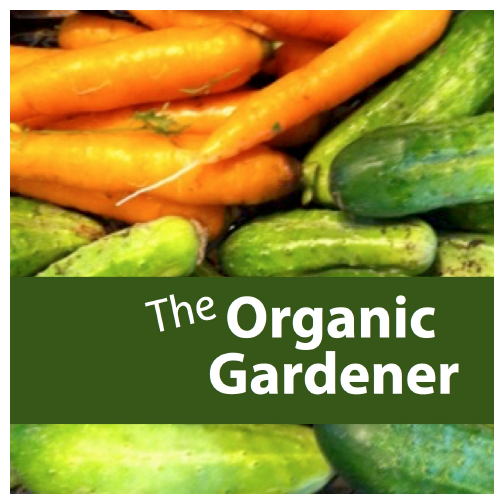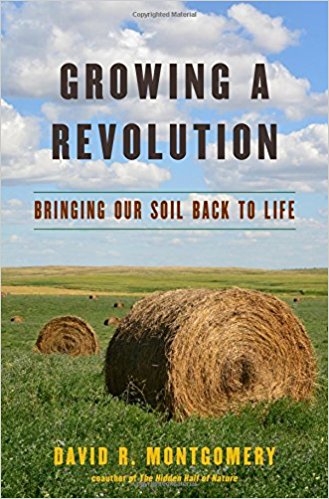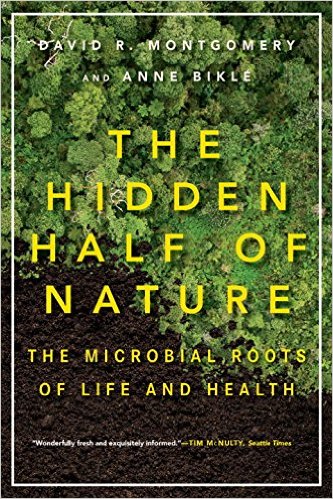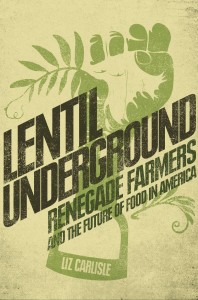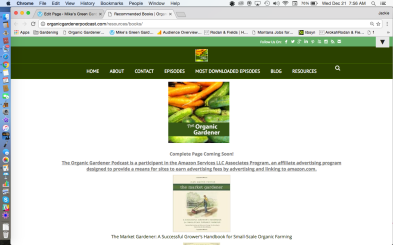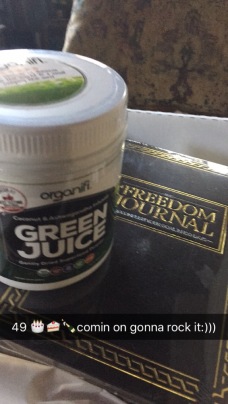186. Growing a Revolution: Bringing Our Soil Back to Life | “Where good Stewardship meets economic gain” | David Montgomery | Seattle, WA
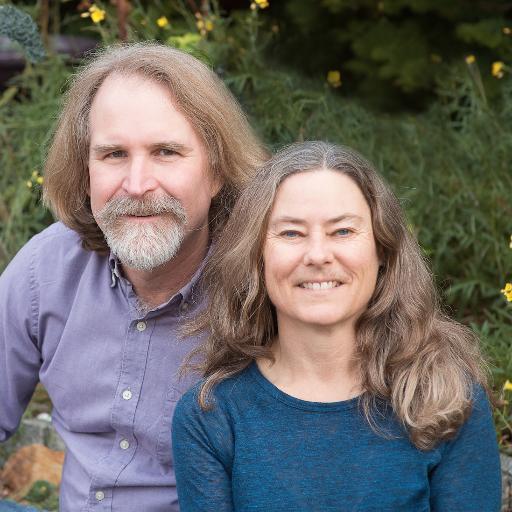
Growing a Revolution: Bringing Our Soil Back to Life | “Where good Stewardship meets economic gain” pg 24. David Montgomery | Seattle, WA
2 brown thumbs;) to understand that joke and hear the pre-chat listen to the podcast itself on iTunes.
The Messengers DVD on Indiegogo
David R. Montgomery was born in 1961 Stanford, California, and studied geology at Stanford University before earning his Ph.D. in geomorphology at UC Berkeley. He teaches at the University of Washington where he studies the evolution of topography and how geological processes shape landscapes and influence ecological systems. He loved maps as a kid and now writes about the relationship of people to their environment and other things that interest him. In 2008 he was named a MacArthur Fellow. He lives with his wife Anne in Seattle, Washington.
Tell us a little about yourself.
I’m a geologist by trying
major hobby and passion
she’s a biologist
looking at plants and the role of microbes
I’ve gotten into gardening by looking over her shoulder and enjoying the fruits of what is happening! Watching how she transformed it from the lawn to nice garden
The New Book looks at translate the principals of we learned by watching our yard come back to life here in North Seattle where we live. How to translate that to larger scale farms and the way how ag can embrace and apply these same practices and principles that worked so well in our yard to revolutionize and transform agriculture adn take it from an environmental problem and all the major problems that are associated with agrochemical intense agriculture and transform agriculture in ways that are practical can maintain yeilds have a much lower environmental footprint
The book really chronicals my journey visiting farmers around the world who are applying these and principals b
bringing their soil back to life the way Anne did to our yard.
iI knew as soon as I saw your book on amazon my listeners I call them green future growers becasue they are growing us a greener future and this is what it could be.
Tell me about your first gardening experience?
my primary love of garden come from helping Anne in the garden and absorb her passion
grow
I forget to water them I’m not the best plant parent
Right?
But Anne’s a plant whisperer
renting an apartment
transformed the whole place
came to an appreciation of the power of that experience
not only for an individual for the gardener and their love and joy of doing it, but the way their experience can rub off on others
experience what a good gardener can create.
It’s almost like the book the secret garden and how the garden can transform another life. When the kids play in the bucket of worms in my classroom I can’t hardly keep them out of them.
How did you learn how to garden organically?
We’re hardwired to like nature
dealt out of that
little bits of nature
can connect us with our deep roots
evolutionary roots
vision and senses all come together in terms of experiencing nature
I like to view our garden now as a little bit of that whichconnects us with the broader world. I ca’t believe how much time I spend in the non rainy season, in the spring or summer. We have really moved outside 3-6 months in our outdoor living room.
I can tell you about all that
fun book to research
observations I made as a geologist
I worekd all over the world that
studies soil erosion
techie
geomorphologist someone who studies the surface forms of the earth
topography and how it forms
if you do that enough and look at erosion like I have
sculpts terrain and topography you start recognizing patterns
looked at the soil erosion shaping the longevity of human civilizations how
farming practices had destroyed the soil after
follow human history and region after region
affects our history
little of that is taught,
none of it’s learned in school
personal observations
looking at the archeology
final chapter was kind of depressing … chronologically of societies unable to feed themselves. Had to rewrite the end 3 times and then I sort of put the subject aside
started seeing the and we talk about in
She was able to restore the soil in our yard
Turn it from essentially dead dirt into thriving rich soil.
Over the course of a decade she changed our soil.
So counter to what I had seen about the destruction of soils, so I started to pay attention and perk up and go wait a minute!
We can rebuild soil fertility sort of fast here
Microbial life feeds plants
Importance for human health all played out in the book that we wrote together
The Hidden Half of Nature
What if we applied these principles to?
- farming
- gardens at large
- gardens that feed us all
- different kind of gardening
There’s definitely a big difference from a garden feeding a family of four to a farm feeding 150 CSAs to large scale farming.
In Growing a Revolution: Bringing Our Soil Back to Life
I wanted to ask the question:
Could the things that Anne had done to our yard that were so transformative could that be done at scale on big farms? On:
- big industrial farms that we have in North America
- family farms
- small subsistence farms in Africa
I wanted to know how applicable the things we were looking at were. So I started traveling around the world to visit farmers who had literally transformed their soil. Had brought their farms back to life. Taken land was degraded
Something like 1/3 of all farmland in the world has seriously degraded soil!
How do we keep feeding an 8, 9 billion, 10,000,000,000 person planet
Having soil that was degraded was not the way to do it!
So I wondered
- can we reverse that?
-
does it make economic sense?
-
Knew it made environmental sense to do it. But could it be done practically and economically?
It seems like the answer is yes!
Organic-ish
From one’s own garden all the way up to very large farms, that aren’t necessarily organic in nature but that I like to call “organic-ish” because the farmers, many of the conventional Farmers who had adopted these principles and used them for the years.
They had kind of weaned themselves off of most agro-chemicals.
They were getting more organic in nature but that was not their intent they were just finding that they
- didn’t need all the chemical in their own soil which
- all the fertilizer
- the herbicide
- insecticide
they didn’t need them if they adopted these practices and tailor their own environmental technology level to their own soil… There’s a lot of variables
But the principles are what I organized the book around my trip to see famers who were doing it well who were having success in improving their soil and returning the profitability to their farm. And radically lowering their environmental footprint
Some were completely organic but most were intentionally not completely organic or not organic started as conventional farmers but by the time they had restored their soil the difference was getting pretty narrow. It was really interesting.
I know listeners are probably dying to hear what can they do to restore their healthy soil, if they are trying or haven’t even gotten started yet. Where are some of the places you’ve been.
I went to:
- Latin America,
- Costa Rica
- Africa to Ghana
- South Africa
- American Midwest
- North Dakota
- South Dakota
- Ohio
- Pennsylvania
- Saskatchewan, CA
A wide range of farmers who had a wide range of crops some who had
- crops
- livestock
- commodity crop producers.
It was interesting and informative set of farmers. I intentionally selected a biased set. I wasn’t trying to visit the average north american or average African farmer.
I was trying to visit people who had really restored their soil and figure out how they did it.
some of the farms went to in Africa were no bigger then our urban lot in Seattle. People were feeding themselves. They had really no access to capital but they had their own labor.
So the idea that you could bring fertilizer intense green revolution of agriculture to these farmers wasn’t gonna work because they didn’t have the money for fertilizer and patented seeds.
They needed a style of agriculture that they could implement themselves.
Center for No-till Agriculture
Kumasi Ghana
Masters degree in Nebraska looking at no-till farming. and then came back and adapted to practices in Ghana
What he’s done is taken his farm and turned it into a teaching farm
show them how he was doing things and how much it had
- reduced erosion off of his fields
- improved the quality of his soil
- doubled crop yields
going from traditional practices essentially slash and burn
clear burn, plant, go away for 10-20 years farm another piece of land while nature rebuilt the fertility etc. That works great if you have a low pop density but if you have a lot of people you run out of land…. can’t keep doing that practice
part it relied on
jungle growing plants up and rotting and returning nutrients to soil
year after year
No-till Success in Ghana
took them from those practices…
- taught them how to go to no-till
- cover cops in and around the main crops
- organic matter that would produce organic matter that would enrich the soil.
He literally doubled the crop yields!
Leap frogging past modern conventional agriculture… by skipping the fertilizer an intense ag took this village where nobody owns there own home and a decade later everyone owns their home.
transformative change!
one end of the spectrum
mostly manual labor, hardly any inputs, radical transformation of the soil…
I just have to ask because I can’t imagine listeners aren’t wondering the smae thing… about water. Probably no irrigation system. Hauling water, rain?
- in an area where it is rain fed
- surface streams
- no irrigation
innovative irrigation that I saw. There are lots of areas where there are lots of plastic water bottles
take a water bottle
poke a hole and fill it with water…
place it by plant when it was
recycled plastic bottles as a drip irrigation system
turned something that had been garbage and turned it into a useful tool for gardeners…
My kids and I did a project for earth day about recycling and Seattle… I have water bottles coming out my Kazoo! I try to recycle, I try to carry gallon jugs… I try to use the filter at school.. . it doesn’t keep up… we’ve been thinking about a drip system… who will water when school gets out.
big attractions of the north american farmers for using these new techniques
saves on irrigation because it helps keep water in the soil and your plants can get at it
3 principles
Minimizing the disturbing the soil – no till planting.
Not digging, rototilling, or distrubing the soil becaus that
- breaks up the microizal fungi
- crusts up the soil water
- runs off the surface
giving up the plow
Planting cover crops
Natural forests, how many places do you see bare earth? Nature tends to clothe herself in plants for good reason, because when those plants die or they shed their leaves it puts organic
- feed microbial life
- transfers nutrients into the soil… That’s what we talked about in the hidden half of nature
It works on big farms as well
minimizing the disturbance
Adding cover crops
especially using legumes to get nitrogen into of the soil when they die and rot they add carbon to the soil
3rd leg of this new of this philosophical
diversifying the crop rotations
not growing
monoculture
repeating it
basically setting the table for pests and pathogens
inviting pests to dinner basically, if something shows up and nibbles on you are corn this year if you plant corn in the same field, then the hatched eggs are then gonna be growing up in a kitchen well stocked with what they want to eat!
But if you break up that same thing in the same place
moving it around your farm
it’s really effective at breaking up the pest and pathogen carryover problem
doing those things together
life will perforate the soil
Create openings in it that helps water sink down into the soil … you can store one to 3 inches soil in a healthy fertile soil, that used to run off … Works for farm very large arms 20000 acres could almost stop irrigating once they adopted these practices becasue they didn’t get much rain but it sank in the ground their plants could get it if it did rain it ran off over the surface
not because the rain didn’t drain
WATER is BIG DEAL!
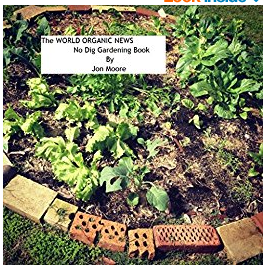
Water is definitely a big deal. I didn’t even know what no-till gardening was until Jon Moore talked about it… did you say don’t dig in the ground… as his parting advice… Jon started his own podcast World Organic News! I was so jealous, but his show is great!
That’s the thing I love about my podcast. To me the millenials are the best and changing the world. There’s this one girl Mandy Gerth, my gardening cross-fit winner of 2015! One of my guests talked about gardening cross-fit to get rid of her knapweed …. and where does it grow where you have unhealthy soil… well I’m not gonna irrigate on this hillside… this would be a potential to getting rid of the spotted knapweed without using the chemicals. And there’s been so many commercials on for weed and feed and kill you weed chemicals!!!
It’s a different way of thinking about it… you have a field that has weeds
take an herbicide to get rid of weeds and it makes a blank slate what’s gonna come back first
And the human gut parallels it… we write about that in
The Hidden Half of Nature
solid science behind why that is.
But if you think of the problem for weed control
I’m gonna do it with chemicals creating a blank slate, it creates a perpetual habitat for weeds in your attempt to get rid of them!
That’s not a great strategy!
Cover Crop Weed Control
In the other hand from a different perspective! If you try to fight your weeds with Cover crops… where you are growing something else so there is something growing there already, the weeds don’t have a chance to start, they get out competed by the cover crop.
Soil Fertility Restoration
Then the cover crop has the advantage that organic matter. Uses crop rollers – almost like a steam roller instead of plowing their lands the let the cover crops grow up and drive over it with this thing called a crimper
- knocks the cover crop before it goes to seed
- returns all those nutrients
- nourishing the crop that comes next
The philosophy of are you gonna do it with competing with the weeds or just killing them with chemicals, lead you down completely different paths
One restores fertility and the other systematically degrades the soil.
One’s a good choice and one’s not!
It’s possible! We actually can do it
some of the problems are I think you touched on earlier
If it’s a change of thinking that leads to a change of practices.
how do you sell somebody a product out of it
teach them to adopt a different practice doesn’t cost them
different equipment involved cost tot he farmer but your not selling them a product… say you can advertise … buy this and it will fix your soil
you’ll need to buy less of those products and you’ll fix your soil.
A lot of the impetus for changes are coming from farmers ground up
from farmers who have adopted these changes not from government
who have seen
- net benefits
less chemicals
growing just as much food and spending less to grow just as much
They’re telling their neighbors and they’re teaching others about it. My hope is that these ideas can spread widely and transform agriculture that isnt gonna do away with fertilizers
not gonna do away pesticides and pest but but greatly reduce our dependence on them…
Have you heard of a woman called Liz Carlisle who wrote a book called the Lentil Underground ?
Yes, I met her a couple of days ago and we were both at a conference in Minneapolis.
Her book delves into the question of if we know these are good practices why aren’t we using them. So all I can think is here is a scientist who is credible source of information!
mitigate
problems
last
one of the things I did in the book as an academic scientist
are the experiences of the farmers I visited are those things that academic science would back up. Is there other independent evidence that these practices work. I did a bunch of background research that parallels the experience of the farmers so I have back up elements of what they are doing and saying. It’s important to do that kind of homework. But nobody want’s to read a book about what did the latest academic
much more interesting to go. What is that
ahead of the academic curve
what are people are finding that suggest these people are really onto something?
Do you want to tell us more about that?
one of the things
well see there are people have done studies of studies = metaanaylsis.
Effect of no-till ag on the amount of carbon in the soil
yields of crops. When you get into those you find soem fairly mixed results
burry
parse a number of those studies
In Growing a Revolution: Bringing Our Soil Back to Life
Studies who looked at farmers who integrated all THREE PRACTICES –
-
Minimal disturbance
-
integrating cover crops
-
diversifying rotation
those studies show
The body of them support the experiences of the farmers I visited had their yields back up to where they were with conventional and maybe exceed them
greatly lower your input use and make your farm more profitable….
just look at the academic studies… look at one effect.
Don’t look at all three acting synergistically as a system. Just the results sepearately.
adopting all three is where the major affect lies…
good reasons for that
those 3 practices cultivate the beneficial
That’s why I called the subtitle is bringing our soil back to life
literally actually bringing life back to soil
most organic farmers know this
gardeners
life filled soil
nutrients cycling
poop and fertilize the soil
philosophy
chemistry and physics
adding phosphorus
nitrogen
making sure there is enough water.
not the whole story
researching
backs up what theese farmers were sharing
in their experience
Look at farming as an ecological process
ecological
but in the scientific sense
interaction of organisms
roots of the plants
different way of looking
different philosophy that turns the modern view upside down
If you were to characterize modern farming as
- high disturbance – plow a lot
- leave bare in between crops – no cover crops
- monoculture basically corn and soy not much of a rotation
What I am arguing that seems to restore fertility is the opposite
-
minimal disturbance
-
integrating cover crops
-
diversification
It’s kind of a big ask to get people to think so differently about the way they farm or garden. Once we think about it differently and see the soil differently
gardening or farming as applied ecology
Culitivating the beneficial ones that work for the goals we have in mind then those new principle make perfect sense. And you visit farmers around the world, like I did who have been practicing. It works real good!
One of the things Liz talks about is the banks, being scared to plant a cover crop and not having a producing crop. So if you have documented cases where it’s working, they can take your book to the bank and say… here look at this.
That’s part of the reason I wrote the book because we also have to look at the way we structure our crop insurance program
because if you plant a cover crop you are not eligible for crop insurance
and that’s crazy!
a lot of policies that could be revisited how we look at ag subsidies
commodity crops
build markets for other cover crops
support a new style of agriculture. is eat more beans
beans are a legumes
peas are good for you as a person they are good fro your biome as well as
soil micro biome
growing cover crops
some of these farms in Africa were real succesful
multiple crops in the same field…
corn and cowpeas
At the same time… corn and harvest and then plant the cow peas or like the corn is growing and the cow peas and you pick the corn.
Farms in Ghana some had 8 crops in the field at once. Because they were hand harvested … that was the most extreme example but it was pretty impressive
- plantains
- corn
- peppers
- cassava
in the same field
companion crops growing 2 crops at once growing cover crop in-between the rows of ones main crop!
can actually be done
commonly done in the us
cove crops coming in the farming
There’s a lot of interest in how to shave their costs so if you can show them a way to decrease the amount they spend on herbicides and pesticides it’s gonna save them money as long as they don’t lose yields!
If they can rebuild the fertility of their soil they can rebuild their soil that will support the kind of yields they get without using large amounts of chemical inputs.
There was a farmer I visited in Ohio who took me to see his neighbors fields and I got a good view of his fields and soil
and neighbors soil
He doesn’t use hardly any chemicals and he’s harvesting a yield better then county average. He walked me through the farm economics and how much he spends and how much he makes and the spending against what his neighbors are doing and he’s much more profitable.
You go look at his fields. His yields. His soybeans for example 50% or higher
You just look at the fields, and go Oh! His neighbors who are using conventional techniques have all these herbicide resistant weeds coming in. Where mariners tail and things you can’t harvest.
herbicide of their
They had about half the soybeans that he had on his farm which is not organic but he hardly uses any chemicals
rich soil
used carbon content
Built up the carbon content 6-8% from where he started which is less then half of a percent 30 years ago.
He has radically transformed it! He has cut his expenses so much that he’s very profitable relative to his neighbors who are basically at the mercy at the commodity prices. If it dips below $5/bushel they lose money, they don’t make money.
One of the shocking statistics I found when researching the book 2015
1/4 of farmers in Iowa lost money growing commodity corn and soy. They are working some of the best ag land in the world! Something’s wrong if hardworking farmers in Iowa lose money growing commodity prices are too low, and input costs too high! So they are just squeezed out in the middle.
Do you want to tell listeners what a commodity crop is? Is that like corn?
Most of it doesn’t go to feed a person.
Most of the corn,
soybeans
look at what happens to what corn in they country
goes to feed
what happens to most of the corn and soy sold in the US. Most goes back into processed foods to developed world or livestock in Canada and US. When I mean it’s a commodity crop it’s not going from farm to someone’s table it’s going to a processing plant that will convert it into a processed food.
I was thinking it went to corn oil, from muffins to gummy bears to evertyhing like that Corn syrup, candy and cereal. It seems like if you flip over a box of processed food, the first ingredient is corn syrup…. I found out about Liz when I joined the AERO workshop and met the actual farmers. When you eat the fresh lentils, and peas your talking about, they are so good, it’s not like eating what you normally think of lentil soup. They are delicious!
silage feeding livestock
that is one major outlet
good for the soil too
we want to
diversify what we eat
Let’s take a minute to thank our affiliates!
Recommended books on the Organic Gardener Podcast
Growing a Revolution: Bringing Our Soil Back to Life
The Hidden Half of Nature
The Organic Gardener Podcast is a participant in the Amazon Services LLC Associates Program, an affiliate advertising program designed to provide a means for sites to earn advertising fees by advertising and linking to amazon.com
Now you can get an Organic Gardener Podcast discount at organifi.com use promo code OGP16 (that stands for organifi.com use promo code OGP16 (that stands for Organic Gardener Podcast 2016) at checkout for a 15%discount!
Let’s Get to the Root of Things!
Which activity is your least favorite activity to do in the garden?
The least favorite for me would be killing slugs and snails. I don’t like killing things let’s just say every now and again… I’ll be asked to participate in the killing of slugs and snails, I just don’t like killing things.
How do yuo do that? do you put them in beer?
drowning them in beer might be somewhat more humane then the technique we do which is just throwing them out in the street.
How about your favorite activity to do in the garden?
play guitar
What’s your favorite song to play?
varies by the day
Do you write your own music?
figure
play in a band called Big Dirt
Soundhouse is our most recent
We’re all getting older … none of us gonna be professionals… nice to absorb inspiration!
What is the best gardening advice you have ever received?
The best advice I can share that Anne and I came up… when we give talks on the with the
The Hidden Half of Nature with is that
care and feeding of your own
mulch your soil inside and out.
How do you mulch your inside? She probably told me last week… it’s been a long week!
mulch your
feed your own micro biome
organisms that live within your gut
whole plant foods
How do you mulch a garden your dealing with organic matter
leave and compost and mulch
similar advice for
dealing with diet
whole plant foods to mulch the inner part of your gut
A favorite tool that you like to use? If you had to move and could only take one tool with you what would it be.
whatever tool we need for the job
has a Japanese digging knife. She likes and I’m actually quite fond of
knives we use for sampling carbon dating.
solid knife.
Knives are important!
A favorite recipe you like to cook from the garden?
One of the things that Anne did when we were researching
The Hidden Half of Nature
What we should be eating, the nature of a good diet and she came up with a recipe I really like
- taking beans
- cooking them
- putting them in the oven and kind of popping them like popcorn
- Can be used as part of a salad or the base of something else.
little olive oil and salt
boy do I like it!
all kinds
- black beans
- pinto beans
- all kinds of beans
cook them first
You do cook them in water?
Yes once you have that you put them on a cookie sheet
essentially
popcorn
and they’re really good for you and way better for you then popcorn!
A favorite internet resource?
fond of twitter
against my better judgement
we found there’s a community of people tweeting back and forth about things in science
that relate to organic food
sustainable agriculture
human microbiome
really great way to be pointed to new studies
one of the problems being an academic scientist
so many studies
hard to stay on top of things
sharing that with each other has been really useful for me
A favorite reading material-book, mag, blog/website etc you can recommend?
Ill give you two books a little obscure
one is called the One-Straw Revolution
Japanese farmer
grew up before the 2nd world are
early 70s
Japanese farming practices
many of the principles
take on it is inspirational
no new ideas
rediscovering
also
Farmers of Forty Centuries: Organic Farming in China, Korea, and Japan
Franklin H King
completely forgotten about till the 1940s
us agronomous
asian farming practices
philosophy done there
done in us at that time
sustainable ag
interesting historical
fairly good books
research and writing books of ones own
that
If you have a business to you have any advice for our listeners about how to sell extra produce or get started in the industry?
biggest
adopt all three
don’t just sort of dip a foot in. Don’t just try to go no till and not do the cover crops
system this whole different way
One of the farmers that did not adopt gradually learned to use this new system and adapt it to their land took them 20 years who to develop this new system is that looking back they could now do it in 2-3 years if they wanted to do it all at once.
We could radically transform pretty fast by taking the experiences of people who have done it! And applying it all at once!
Be BOLD!
Final question-
if there was one change you would like to see to create a greener world what would it be? For example is there a charity or organization your passionate about or a project you would like to see put into action. What do you feel is the most crucial issue facing our planet in regards to the environment either in your local area or on a national or global scale?
It could be a long list
stick to one I’ll sort of cheat a little bit
the issue with the climate we face is huge and daunting
not depend on fossil fuels need to restructure our economy is
we need to restructure agriculture
that’s why I wrote
Growing a Revolution: Bringing Our Soil Back to Life
fundamental needs quite happy it is pretty easy to do is that it can it be done perspective
to get there
it’s really rethinking our ag subsidies. We’re basicaly subsidizing practices that degenerate soil the more we farm that leads to less people will be able to do so…
we should be subsidies
Build Fertility
love to see
fundamental shift in the way that our institutional government programs and support farmers who are adopting regenerative methods and techniques
stop subsidizing practices that degrade the soil.
How does someone go about helping solve that problem write thier congressman?
I may not be the best person…
a couple of ways in
Farm Bill of 2018
new farm bill in 2018 if you are inclined towards political activism
lobby your representatives to get in or reform the farm bill – tends to be written by a few legislatures from a few key states but should be something we are all interested in.
what kind of food do you buy
where do you buy it
what do you buy
difficult to know if your buying from a store or a farm that had food had soil building or soil so you can get to know who’ the people are that are growing your food
support your local farmer’s market
how it’s done
that can be depending on where you are
I always like to tell listeners is that even if your representative wants to get something passed if they don’t have people backing them. If you have someone that believes like you do. It’s so easy. They gonna be super friendly. You’ll pretty likely get some young intern who’s gonna just take a note. I wouldn’t say I have my congress people on speed dial but I call when I get emails that ask and they usually have a script for you.
Do u have an inspiration tip or quote to help motivate our listeners to reach into that dirt and start their own garden?
I’ve been really surprised by how much food Anne is growing in a really small space in our yard! As for an inspriational tip, is that even if you have a small amount of space you can transform that into something that can produce the freshest food imaginiable. All the studies about nutritional food I have found is the time between when it’s picked and when it’s eaten is the biggest factor in nutrient dense food
right outside the window
well worth thinking everyone should grow a a little bit or a lot of their own food…
I thought what you said in the beginning about spending time in the garden with Anne was so eloquent.
How do we connect with you?
Growing a Revolution: Bringing Our Soil Back to Life
We’d love if you’d join Organic Gardener Podcast Facebook Community!
